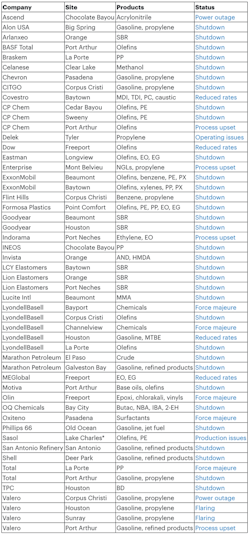Winter storm ices USGC refining, petrochemical operations
US Gulf Coast (USGC) refining and petrochemical operators along the Texas and Louisiana coasts are assessing gradual restarts of plants following several days of freezing temperatures that led to unprecedented unplanned shutdowns of regional processing and production capacities.
While most refiners and petrochemical producers have declined to publicly confirm actual impacts to operations, independent data based on operator notifications to customers and individual plant monitoring collected by ICIS, IHS Markit, S&P Global Platts, Wood Mackenzie and Rystad Energy showed anywhere between 2.0-5.2 million b/d of USG refining capacity remained offline as of Feb. 19 amid reports of damage to plant equipment, disruptions to transportation networks, and loss of feedstock supplies resulting from nearly a week’s worth of power and utilities outages caused by Winter Storm Uri.
With most USGC refineries shut down or at reduced rates and large portions of waterborne export terminals, rail, and pipeline infrastructure also impacted in the storm’s wake, Uri has had a larger impact on the US product supply system than Hurricane Harvey in 2017, during which 4.8 million b/d of refining capacity was shuttered, according to Debnil Chowdhury, IHS Markit’s executive director.
“Despite its immediate and devastating impact, the good news is that the impacts from Uri should be shorter in duration and have a more moderate impact on consumers compared to the aftermath of Harvey,” Chowdhury said.
“There is always a question of how equipment and systems will respond to extreme weather conditions that they were not designed for, but it appears that the refineries and other facilities will come back online much quicker this time once power systems recover,” Chowdhury added.
But even as the USGC is equipped with spare refining capacity to pick up the slack from storm-related outages in the short term, Rystad Energy points out that refiners’ previous decisions to delay regularly scheduled maintenance events amid reduced demand stemming from the coronavirus (COVID-19) pandemic heighten the risk of additional outages this year.
“We find that as refiners ramp up runs towards the summer to meet the expected increase in end-user demand, the delayed planned maintenance could increase unplanned outages as the heightened stress from higher run rates could cause machine breakdowns,” said Paola Rodriguez-Masiu, Rystad Energy’s vice-president of oil markets.
If combined with another external shock, such as a repetition of last year’s hurricane season, it could result in very tight product markets for second-half 2021, according to Rodriguez-Masiu.
Petrochemical woes
While refiners continue to deal with restart plans in the wake of Uri, US petrochemicals producers have sustained the brunt of storm-related impacts, with ICIS reporting more than 60 plant outages following Uri’s trek across the USGC petrochemical hub.
Combined estimates from ICIS and Wood Mackenzie’s sister company Genscape indicate between 80-90% of total US olefins capacity is currently shuttered.
“Worst hit in volume terms is ethylene, with [26-million tonnes/year (tpy)] capacity offline, representing 67% of the US total, [as well as about 11-million tpy, or 50%] propylene capacity also offline,” said Will Beacham from ICIS Chemical Business.
Olefins capacity still online also is most likely operating at reduced rates or impacted by wider supply chain disruptions, with paralyzed US petrochemical production currently upsetting about 15% of the global olefins market, according to Wood Mackenzie.
“This is a [major] impact to one of the world’s largest concentrations of olefins capacity, just under 20% of the global total, and tops recent disruption seen in August 2020 from Hurricane Laura. US olefins industry capacity has been in expansion mode over the last several years, facilitated by shale gas economics. The recent disruption is therefore impacting a larger base of US and global olefins supply,” said Patrick Kirby, principal analyst for Wood Mackenzie.
“Upstream and downstream disruptions will likely result in a staggered and complex capacity restart once immediate weather and power disruption issues pass. This could potentially extend the emergency from days to weeks before market continuity and stability returns,” Kirby added.
Based on reports from market sources, S&P Global Platts said inspections ahead of plant restarts could be lengthy given the need to assess any leaks or cracks in pipes. Restoration of full power to the plants also is required to conduct these inspections.
The accompanying table from ICIS shows the operating status of current refining and petrochemical plants in Texas as of Feb. 19.
About the Author
Robert Brelsford
Downstream Editor
Robert Brelsford joined Oil & Gas Journal in October 2013 as downstream technology editor after 8 years as a crude oil price and news reporter on spot crude transactions at the US Gulf Coast, West Coast, Canadian, and Latin American markets. He holds a BA (2000) in English from Rice University and an MS (2003) in education and social policy from Northwestern University.

